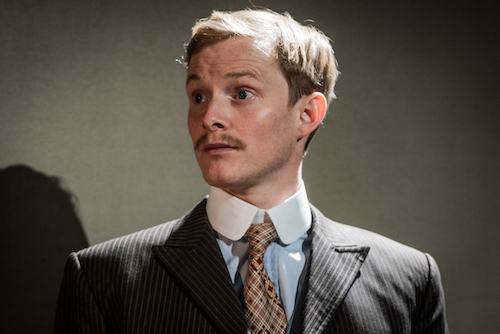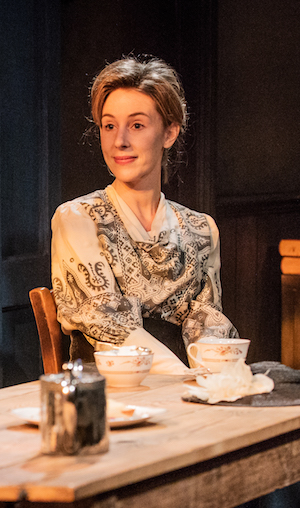Agnes Colander, Jermyn Street Theatre review - Naomi Frederick shines in 'new' Granville Barker | reviews, news & interviews
Agnes Colander, Jermyn Street Theatre review - Naomi Frederick shines in 'new' Granville Barker
Agnes Colander, Jermyn Street Theatre review - Naomi Frederick shines in 'new' Granville Barker
A rediscovered early work by a giant of 20th century theatre focuses on a woman's struggle for independence

Remembering meeting Harley Granville Barker when casting him as Marchbanks in Candida, Shaw described the 23-year-old as, "altogether the most distinguished and incomparably the most cultivated person whom circumstances had driven into the theatre at that time." He judged his performance as the romantic poet "perfect".
Granville Barker was a remarkable man of the theatre, way ahead of his time, advocating a National Theatre, instigating a repertory system, arguing against censorship, establishing the role of the modern director and writing ground-breaking plays and, later, still-valuable Prefaces to Shakespeare.
Any play by this giant of the theatre must be considered a find. Nelson says in the Introduction to the published script that he has made no effort to change meaning, only to clarify where the typescript, covered in pencil corrections, in unclear. The result, we must assume, is as close as possible to the original. In 1929 Barker scrawled on the typescript that he suspected it to be "very poor. It should certainly not be published. It might well be destroyed." In 1932 he underlined the word "destroyed". And yet he kept it and it was still with him when he died in Paris in 1946.
Nunn has suggested on these pages that Barker perhaps thought that, given its unconventional view of a woman's role, he wouldn't get the script past the censor. Isn't it just as likely that Barker knew that he had the kernel of a good play, but always intended to tinker with it further? Chambers and Nelson say they believe what we have is a draft. Barker often rewrote: there are several published versions of his best-known works, Waste, The Voysey Inheritance and The Madras House.
On the evidence of this production, now transferred to the tiny Jermyn Street venue, Agnes Colander is not entirely satisfactory as it stands. Nunn's production makes the most of Barker's naturalistic dialogue in the rather slow early scenes, but when the interaction becomes more intense in the final act, the melodramatic archness is in danger of becoming risible. Throughout, Agnes herself is a fascinating creation, full of contradictions and confusions, a strong woman struggling with self-doubt, bravely, tentatively, searching for her place in the world, believing in marriage but turning her back on it. All this Naomi Frederick expresses with glowing naturalness and sincerity.
 Having left an unsatisfactory marriage, Agnes has set out on her own, pursuing her ambition to be an artist, despite doubting her ability. She has two male friends: Otho, whom Barker describes as a man of "undisciplined power, with the occasional wilful effort at self-control" and the boyish idealist, Alec, both vying for her attention. Agnes exchanges her single status for life with Otho in Normandy. As Otho, Matthew Flynn is coarse, earthy, bluntly self-regarding and, exemplified by his greedy devouring of chicken, more interested in satisfying his appetites than tending to a sympathetic relationship. Harry Lister Smith's Alec (pictured above) is naif and just a bit prissy. Agnes seems so far not to have learned much about men in her "attempt at life" and it's hard to see what she finds in either.
Having left an unsatisfactory marriage, Agnes has set out on her own, pursuing her ambition to be an artist, despite doubting her ability. She has two male friends: Otho, whom Barker describes as a man of "undisciplined power, with the occasional wilful effort at self-control" and the boyish idealist, Alec, both vying for her attention. Agnes exchanges her single status for life with Otho in Normandy. As Otho, Matthew Flynn is coarse, earthy, bluntly self-regarding and, exemplified by his greedy devouring of chicken, more interested in satisfying his appetites than tending to a sympathetic relationship. Harry Lister Smith's Alec (pictured above) is naif and just a bit prissy. Agnes seems so far not to have learned much about men in her "attempt at life" and it's hard to see what she finds in either.
Nunn is keen to emphasise that "the sex question" refers, not just to gender inequality but to female desire. The boorish Otho perhaps satisfies this in Agnes for a time, but she shows little relish for it. Sally Scott's lively Emmeline (pictured right), the conventional but flirtatious widow next door, is a reminder of the more usual contradictions for women of the time. Emmeline likes to be kissed, even by someone else's husband, but she would "cut" Agnes in public.
Robert Jones transforms the cramped acting space into a cluttered artist's studio, and then, aided by Paul Pyant's atmospheric lighting and Fergus O'Hare's sound design, an airy French house by the sea.
If Agnes Colander looks like a work in progress, it is valuable work, investigating the shifting area between lust, love and friendship and examining the true nature of freedom. Agnes does not slam the door on convention in the manner of Ibsen's Nora, but sets out rather more quietly on a new experiment, to choose how to live as she wishes, a "man-like" idea.
The future of Arts Journalism
You can stop theartsdesk.com closing!
We urgently need financing to survive. Our fundraising drive has thus far raised £49,000 but we need to reach £100,000 or we will be forced to close. Please contribute here: https://gofund.me/c3f6033d
And if you can forward this information to anyone who might assist, we’d be grateful.

Subscribe to theartsdesk.com
Thank you for continuing to read our work on theartsdesk.com. For unlimited access to every article in its entirety, including our archive of more than 15,000 pieces, we're asking for £5 per month or £40 per year. We feel it's a very good deal, and hope you do too.
To take a subscription now simply click here.
And if you're looking for that extra gift for a friend or family member, why not treat them to a theartsdesk.com gift subscription?
more Theatre
 Not Your Superwoman review – powerful tribute to the plight and perseverance of Black women
Golda Rosheuvel and Letitia Wright excel in a super new play
Not Your Superwoman review – powerful tribute to the plight and perseverance of Black women
Golda Rosheuvel and Letitia Wright excel in a super new play
 Cow | Deer, Royal Court review - paradox-rich account of non-human life
Experimental work about nature led by Katie Mitchell is both extraordinary and banal
Cow | Deer, Royal Court review - paradox-rich account of non-human life
Experimental work about nature led by Katie Mitchell is both extraordinary and banal
 Deaf Republic, Royal Court review - beautiful images, shame about the words
Staging of Ukrainian-American Ilya Kaminsky’s anti-war poems is too meta-theatrical
Deaf Republic, Royal Court review - beautiful images, shame about the words
Staging of Ukrainian-American Ilya Kaminsky’s anti-war poems is too meta-theatrical
 Laura Benanti: Nobody Cares, Underbelly Boulevard Soho review - Tony winner makes charming, cheeky London debut
Broadway's acclaimed Cinderella, Louise, and Amalia reaches Soho for a welcome one-night stand
Laura Benanti: Nobody Cares, Underbelly Boulevard Soho review - Tony winner makes charming, cheeky London debut
Broadway's acclaimed Cinderella, Louise, and Amalia reaches Soho for a welcome one-night stand
 The Pitchfork Disney, King's Head Theatre review - blazing with dark energy
Thrilling revival of Philip Ridley’s cult classic confirms its legendary status
The Pitchfork Disney, King's Head Theatre review - blazing with dark energy
Thrilling revival of Philip Ridley’s cult classic confirms its legendary status
 Born with Teeth, Wyndham's Theatre review - electric sparring match between Shakespeare and Marlowe
Rival Elizabethan playwrights in an up-to-the-minute encounter
Born with Teeth, Wyndham's Theatre review - electric sparring match between Shakespeare and Marlowe
Rival Elizabethan playwrights in an up-to-the-minute encounter
 Interview, Riverside Studios review - old media vs new in sparky scrap between generations
Robert Sean Leonard and Paten Hughes make worthy sparring partners
Interview, Riverside Studios review - old media vs new in sparky scrap between generations
Robert Sean Leonard and Paten Hughes make worthy sparring partners
 Fat Ham, RSC, Stratford review - it's Hamlet Jim, but not as we know it
An entertaining, positive and contemporary blast!
Fat Ham, RSC, Stratford review - it's Hamlet Jim, but not as we know it
An entertaining, positive and contemporary blast!
 Juniper Blood, Donmar Warehouse review - where ideas and ideals rule the roost
Mike Bartlett’s new state-of-the-agricultural-nation play is beautifully performed
Juniper Blood, Donmar Warehouse review - where ideas and ideals rule the roost
Mike Bartlett’s new state-of-the-agricultural-nation play is beautifully performed
 The Gathered Leaves, Park Theatre review - dated script lifted by nuanced characterisation
The actors skilfully evoke the claustrophobia of family members trying to fake togetherness
The Gathered Leaves, Park Theatre review - dated script lifted by nuanced characterisation
The actors skilfully evoke the claustrophobia of family members trying to fake togetherness
 As You Like It: A Radical Retelling, Edinburgh International Festival 2025 review - breathtakingly audacious, deeply shocking
A cunning ruse leaves audiences facing their own privilege and complicity in Cliff Cardinal's bold theatrical creation
As You Like It: A Radical Retelling, Edinburgh International Festival 2025 review - breathtakingly audacious, deeply shocking
A cunning ruse leaves audiences facing their own privilege and complicity in Cliff Cardinal's bold theatrical creation
 Edinburgh Fringe 2025 reviews: Refuse / Terry's / Sugar
A Ukrainian bin man, an unseen used car dealer and every daddy's dream twink in three contrasting Fringe shows
Edinburgh Fringe 2025 reviews: Refuse / Terry's / Sugar
A Ukrainian bin man, an unseen used car dealer and every daddy's dream twink in three contrasting Fringe shows

Add comment